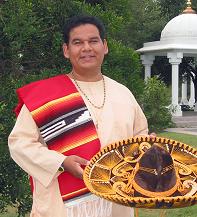Contribute
| A Mexican Comes Home To India |
John Campos
06/13/2004
A few years ago, an Indian woman dressed in a sari approached me at a gas station and asked if I knew the directions to the local Hindu temple. The woman explained she was visiting Austin and had heard about this beautiful temple. I was able to give her directions, as I regularly attend the temple. As she walked away, she asked me from which part of India I emigrated. I told her I was not Indian, but rather of Mexican origin. She swirled around and looked at me astonishingly. “That’s amazing,” she said. “A Mexican Hindu! I’ve never heard of such a thing!” It wasn’t the first time I had been mistaken for another nationality.
I’m often asked whether I was born in India. The question amuses me, because I could respond both “Yes” and “No.” But such an answer would confuse people, as well as require a lengthy explanation from me, so I usually respond “No,” I was not physically born an Indian. My ancestors were from Mexico, but they left their country for the United States. At times, though, I want to provide a different response. Undoubtedly, I was spiritually born an Indian when I adopted the Hindu faith several years ago. This requires an explanation that entails a journey -- a spiritual one that I’ll share.
Many non-Indians have recognized the spiritual wealth of Hinduism and have liberally taken from its treasures: its teachings of bhakti meditation to a personal form of God; its Sanskrit scriptures and verses; its instruction on the philosophy of living are but a few of its priceless spiritual jewels. But what is a troubling and growing phenomenon, however, is that it seems that Indians who are Hindus by birth do not value the immense wealth of their birthright. And in the process, I believe they are becoming spiritually bankrupt.
Many years ago, a co-worker of mine -- an Indian Hindu -- and I were discussing religion. He confided to me that he did not regularly attend any type of religious services and did not really know much about Hinduism. He admitted that he did not even follow some of its basic principles: he was non-vegetarian and had grown accustomed to drinking and smoking. Because of his non-interest in his birth religion, he was not making any effort to instruct his children about it and had resigned to let them choose their own faith and religion. He added that many Indians such as himself had come to view their local temple as a place to socialize and network, rather than a place to practice their beliefs in good faith. He noted that I probably knew more about Hinduism than he did, and it was surprising to him that someone without this birthright would value it enough to adopt it.
My co-worker’s story is not a unique one. Many Indians who immigrate to the United States have many things in common. They’re educated, they’re ambitious, and they’re lured by the promise of material success. But along the way to material achievement, it appears to me that many forget their birthright to the great spiritual ancestry that is Hinduism. Unfortunately for many Hindus, forgetting their spiritual ancestry for the sake of material gain brings to mind a Spanish dicho (saying): quien mucho abarca poco aprieta (whoever grasps much can hold on to little). Indeed, for the sake of enormous material acquisition, it is nearly impossible to hold on to that which is paramount for a soul’s contentment: God’s love.
When I’m asked why a non-Indian such as myself would choose Hinduism, my answer is founded on the practical experience of spiritual happiness. I found that the wisdom contained in the Hindu scriptures was a deep well from which I could replenish my spiritual needs. The discovery was so profound to me, because in searching for personal meaning in my life, I found great solace in Hinduism’s lucid philosophy and teachings of love to a personal form of God, Radha-Krishn.
My previous religious studies in years past were fruitless in that they had not inspired spiritual desire in me. And my reading of western philosophers’ writings impressed me as being dry, intellectual speculations. In contrast, the deep love and devotion to God that manifests in the lives of the great Saints of the Hindu tradition appeals to me. Their promise that through loving devotion – bhakti – one can merge, know, and see God in divine personal form encourages me to have faith in this universal and great religion. By one’s sincere effort and God’s grace, God’s love would fructify in the heart. It did not matter what my race, gender, or belief was. This is the central teaching of Hinduism.
A few years ago, I had the good fortune to visit India. Shortly after arriving at the airport, one of the baggage handlers noticed that my luggage tags were from America. He pointed to my tags and asked if I had just come from there. I said that I had. As he loaded my luggage onto a taxi, he asked me if the journey was tiring. I acknowledged that it was. “But,” he added, “that doesn’t matter – at least you’re home now.” He was right, and I couldn’t help but smile. A Mexican had come home to India.
You may also access this article through our web-site http://www.lokvani.com/
